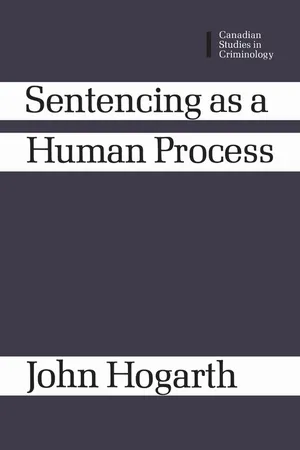eBook - PDF
Sentencing as a Human Process
About this book
Sentencing is not a neutral or mechanical act; it is a human process, highly charged affectively and motivationally. Sentencing decisions take place in a social environment of laws, facts, ideas, and people. This study of sentencing behaviour is primarily concerned with the mental processes involved in decision-making
Tools to learn more effectively

Saving Books

Keyword Search

Annotating Text

Listen to it instead
Information
Table of contents
- Foreword
- Preface
- Contents
- 1. Introduction: The Problem of Sentencing
- 2. The Theoretical Basis to the Study
- 3. Jurisdiction, Appointment, and Tenure
- 4. Background Characteristics of Magistrates
- 5. Penal Philosophy: Similarities and Differences Among Magistrates
- 6. The Meaning of Judicial Attitudes
- 7. The Measurement of Judicial Attitudes
- 8. The Content and Structure of Attitudes to Crime and Punishment
- 9. The Prediction of Sentencing Behaviour from Attitude Scales
- 10. Legal Constraints on Sentencing
- 11. Social Constraints on Sentencing
- 12. The Impact of SocioLegal Constraints on Sentencing
- 13. The Relationship of Social Characteristics to Attitudes and Beliefs
- 14. The Search for Information
- 15. Communication of Information
- 16. The Assessment of Information
- 17. The Organization and Integration of Information
- 18. The Complexity of Thought Processes in Sentencing
- 19. The Prediction of Sentencing Behaviour from Fact Patterns Perceived by Magistrates
- 20. Towards a Model of Sentencing Behaviour
- 21. Summary of Principal Findings
- An Afterword. Implications for the Improvement of Sentencing
- Bibliography
- Index
Frequently asked questions
Yes, you can cancel anytime from the Subscription tab in your account settings on the Perlego website. Your subscription will stay active until the end of your current billing period. Learn how to cancel your subscription
No, books cannot be downloaded as external files, such as PDFs, for use outside of Perlego. However, you can download books within the Perlego app for offline reading on mobile or tablet. Learn how to download books offline
Perlego offers two plans: Essential and Complete
- Essential is ideal for learners and professionals who enjoy exploring a wide range of subjects. Access the Essential Library with 800,000+ trusted titles and best-sellers across business, personal growth, and the humanities. Includes unlimited reading time and Standard Read Aloud voice.
- Complete: Perfect for advanced learners and researchers needing full, unrestricted access. Unlock 1.4M+ books across hundreds of subjects, including academic and specialized titles. The Complete Plan also includes advanced features like Premium Read Aloud and Research Assistant.
We are an online textbook subscription service, where you can get access to an entire online library for less than the price of a single book per month. With over 1 million books across 990+ topics, we’ve got you covered! Learn about our mission
Look out for the read-aloud symbol on your next book to see if you can listen to it. The read-aloud tool reads text aloud for you, highlighting the text as it is being read. You can pause it, speed it up and slow it down. Learn more about Read Aloud
Yes! You can use the Perlego app on both iOS and Android devices to read anytime, anywhere — even offline. Perfect for commutes or when you’re on the go.
Please note we cannot support devices running on iOS 13 and Android 7 or earlier. Learn more about using the app
Please note we cannot support devices running on iOS 13 and Android 7 or earlier. Learn more about using the app
Yes, you can access Sentencing as a Human Process by John Hogarth in PDF and/or ePUB format, as well as other popular books in Law & Criminal Law. We have over one million books available in our catalogue for you to explore.
